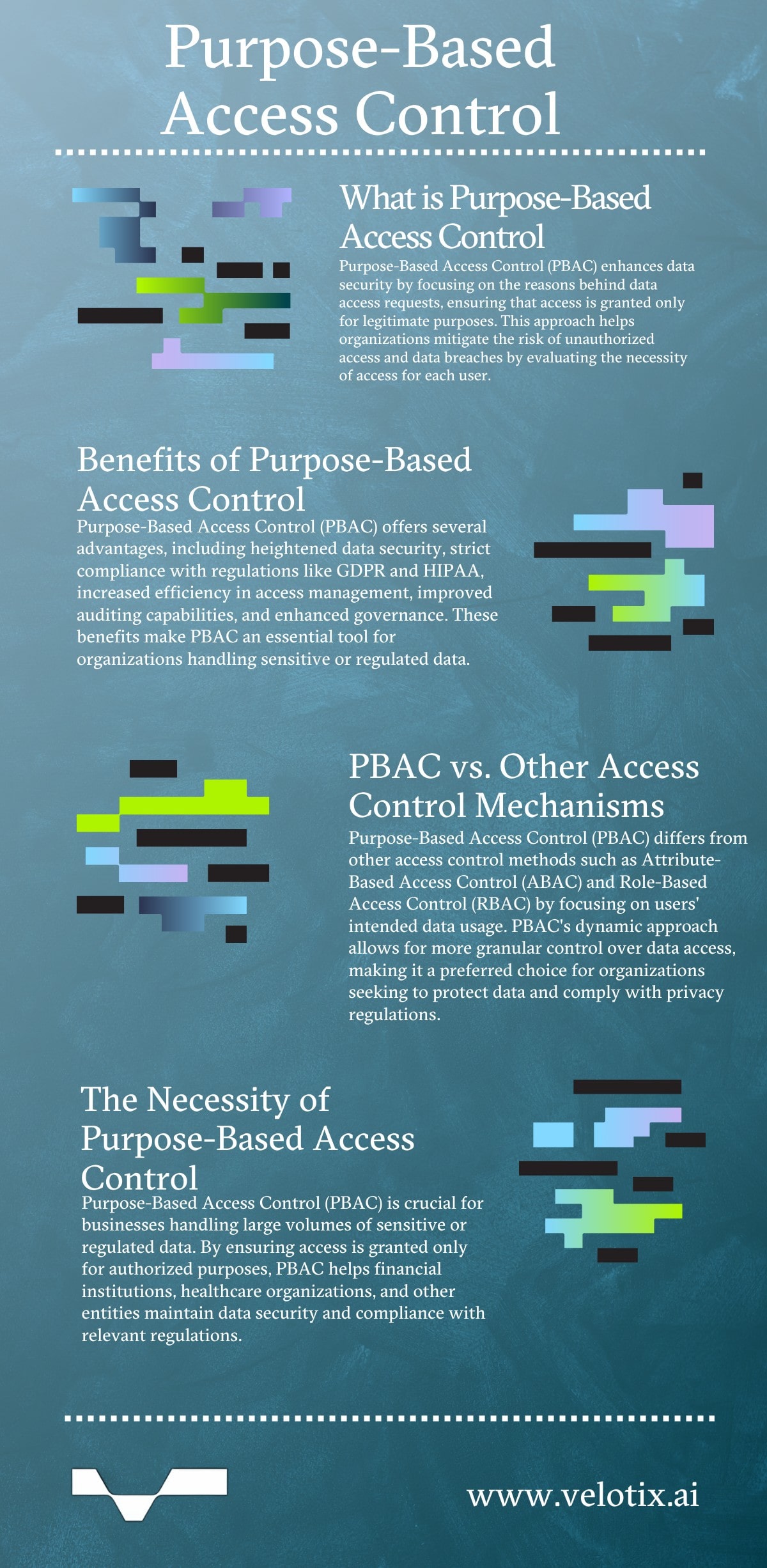What is Purpose-Based Access Control?
Understanding why a user requests data access helps businesses implement more effective access controls. It makes it easier to evaluate whether a request is legitimate or if it should be denied. Granting users access to data sets that aren’t required for their job tasks or functions increases the risk of data breaches and cyber attacks. It also increases the risk of unauthorized access.
Organizations and large enterprises that handle sensitive or regulated data or have complex access management needs often benefit the most from purpose-based access control (PBAC). Financial institutions, healthcare organizations, government agencies, and service providers use purpose-based access control to ensure data access is granted only for legitimate reasons to authorized users.
Benefits of Purpose-Based Access Control
PBAC combines the best of role-based access control (RBAC) and attribute-based access control (ABAC) to create a method for making access decisions and authorizations based on how a user intends to use requested data. Purposes run the gamut from generating reports to performing audits and creating new applications.
Advantages of purpose-based access control include:
Heightened data security: Because purpose-based access control doesn’t focus on individual users and instead makes users justify why they need access to specific data use purposes, it improves accountability and provides an audit trail that protects an organization’s most sensitive and at-risk data at the right time. For instance, a financial services accounts payable employee might need to confirm access to sensitive client data to prepare an invoice.
Strict compliance: Purpose-based access control helps organizations ensure compliance with strict global regulations, including the General Data Protection Regulation (GDPR) and the Health Insurance Portability and Accountability Act (HIPAA). It helps organizations enforce security policies and reduce the risk of unauthorized data access, breaches, and cyber attacks. In the event of a security breach, PBAC helps organizations quickly identify each access request’s purpose to determine if access was granted for an authorized purpose.
Increased efficiency: Purpose-based control access increases efficiency in five key areas. It streamlines access requests, improves resource utilization, speeds up the approval process through automation, simplifies access management, and helps businesses adapt to changing organizational needs and requirements. It also helps organizations with remote or hybrid work models better manage data access, enabling them to define and dictate access control no matter where employees might be located.
Improved auditing: PBAC’s granular auditing trail helps organizations track who accessed data, which data was accessed, the date and time the data was accessed, and the purpose of the data request. By ensuring that access is granted only for authorized purposes, accountability and compliance are improved and security incidents are reduced.
Enhanced governance: Purpose-based access control provides organizations with a clear framework for managing sensitive data access. It increases transparency through explicit audit trails and enhances risk management. PBAC also provides businesses with greater insight into who’s accessing sensitive data and for what purpose, helping them make better-informed decisions about their overall risk management strategy.

How Does Purpose-Based Access Control Differ From Other Access Control Mechanisms?
Three of the most common access control methods are ABAC, RBAC, and PBAC. Attribute-based access control uses attributes or characteristics of a subject, object, and environment to determine whether a user should be granted access. Role-based access control is based on a user’s role or job function in the organization. Purpose-based access control uses a more dynamic approach than the others, setting up policies to determine which roles and which attributes can access which systems and data. It is considered more granular than RBAC and, thus, better able to adequately protect data and comply with relevant privacy rules and regulations.
Why is Purpose-Based Access Control Necessary?
Like other access control methods, purpose-based access control is a vital component of modern security strategies. Businesses with large volumes of sensitive or regulated data can use (PBAC) to ensure access is granted only for authorized purposes. For example, financial service providers use PBAC to ensure access to sensitive data like financial records is granted to users for legitimate purposes. Healthcare organizations use PBAC to ensure patient medical records are secure and access is granted only for authorized purposes like treatment or research.
